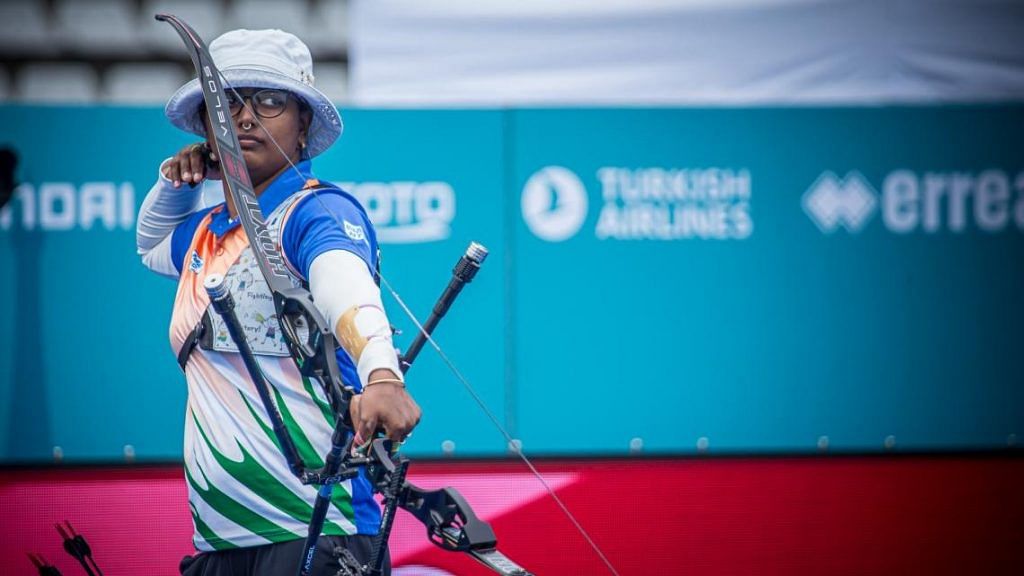New Delhi: A 12-year-old tribal girl from Jharkhand’s Ratu village — 15 km from Ranchi — knew little about archery as a sport, but the prospect of free food that would nourish her was too enticing to pass up. So she enrolled in an academy in Seraikela, where she requested the administration to give her three months to perform, before giving up on her. A year later, she was selected by the Tata Archery Academy in Jamshedpur.
Today, Deepika Kumari has regained her position as world number one — a feat she first achieved in 2012 — after a hat-trick of gold medals in women’s individual, women’s team, and mixed team at the World Cup Stage 3 in Paris Sunday.
The 27 year-old, along with Ankita Bhakat and Komalika Bari, comfortably won against Mexico, securing the first gold medal. She then, pairing with her husband Atanu Das in the mixed doubles category, beat Netherlands’ Sjef van den Berg and Gabriela Schloesser. Finally, she beat world number 17 Russian Elena Osipova to complete the perfect hat-trick.
Jharkhand Chief Minister Hemant Soren took to Twitter to congratulate the archer.
???
तीरंदाजी विश्व कप में एक ही दिन में 3 स्वर्ण पदक जीत कर देश का मान बढ़ाने वाली झारखण्ड की बेटी दीपिका कुमारी को पुनः अनेक-अनेक शुभकामनाएं और जोहार।
? https://t.co/R3Ph9JnQZv— Hemant Soren (@HemantSorenJMM) June 27, 2021
“I want to congratulate her, she has been working really hard. We are very happy with what she has been able to achieve. Atanu Das and Deepika won in the mixed recurve event as well so it is a very proud moment for us,” Kumari’s father, Shiv Narain Mahto said.
No dream is too big
When Kumari was 18 — besides being world number 1 — she won two Commonwealth Games gold medals, and in 2016, she tied the world record.
She turned pro in 2006, and since then has won 12 silver and seven bronze medals at the World Cup. She has participated in the 2012 London and 2016 Rio Olympics where she lost in the opening round and quarter final respectively. She also won two gold medals in the 2010 Commonwealth Games and another in the Asian Archery Championships 2013 among others.
She won the Arjuna Award in 2012 and the Padma Shri in 2016. She married fellow ace archer Atanu Das on 30 June 2020.
However, her journey has been tumultuous. Born on 13 June 1994 to Shiv Narain Mahato and Geeta Mahato — an autorickshaw driver and nurse respectively — Kumari’s first taste of aiming and shooting was with mangoes and stones. But the family’s poor financial condition stood in the way of her dreams, till she joined Tata academy.
“One should not forget what one had to deal with in the past. I still have that auto and I still drive it, but I look at it from the point of view of work. I am very happy with where I am, my daughters tell me to not drive an auto, but I like to do it, it is just my work. Arjun Munda (President of Archery Association) supported us throughout, we will be always thankful to him,” Shiv Mahato said.
While her father was supportive about his daughter taking up a sport, he did have an issue with Kumari living away from home at such a young age. But she persisted. “Please let me go. I want to do this,” she told her father day in and day out, till he finally gave in.
Her mother, on the other hand, has been her rock throughout. “I think of her when I climb onto the podium at an international competition and the national anthem plays. I thought of her when I was receiving the Padma Shri award and swelling with pride,” Kumari said in a 2018 interview.
Also read: For isolated athletes, Tokyo Olympics promises to be the weirdest ever games
‘I didn’t pick archery, it picked me’
Kumari believes her journey has helped pave the way for many young girls from her village who wish to be enrolled into a sports academy.
“I did not pick archery; it picked me. All I remember is walking into an academy that teaches tribal sports and next thing I know, I’m being handed a bow and arrow carved out of bamboo,” Kumari said.
In the run up to the 2016 Rio Olympics, a Netflix documentary — Ladies First — by first-time filmmaker Uraaz Bahl chronicles her training and origin story. “Why don’t they say ‘ladies first’ in education and sports?” asks Kumari, giving rise to the title of the film.
‘One of India’s greats’
Kumari’s journey and her historic win is a commendable milestone.
“Irrespective of what happens before and after the Olympics, she is one of India’s greats. Unfortunately, our sporting lense really just comes into focus for the Olympics. People will associate her name with two failures as opposed to her so many successes,” Snehal Pradhan, former cricketer, told ThePrint.
Underlining the absence of a system that helps tap into rural talent and the need for an identification process, she added, “Deepika has excelled despite the system, not because of it. Some of our best sportspeople have been found despite the system and mostly from rural areas. The amount of non-urban talent is staggering.”
As the 2021 Tokyo Olympics near, her mother has high hopes. “I hope that they both (Kumari and Das) give good performances at the Tokyo Olympics, I am confident that they will come back with a medal,” Deepika’s mother said.
Also read: Dingko Singh — the ‘hot-blooded’ Asian Games gold medalist who inspired a generation of boxers
